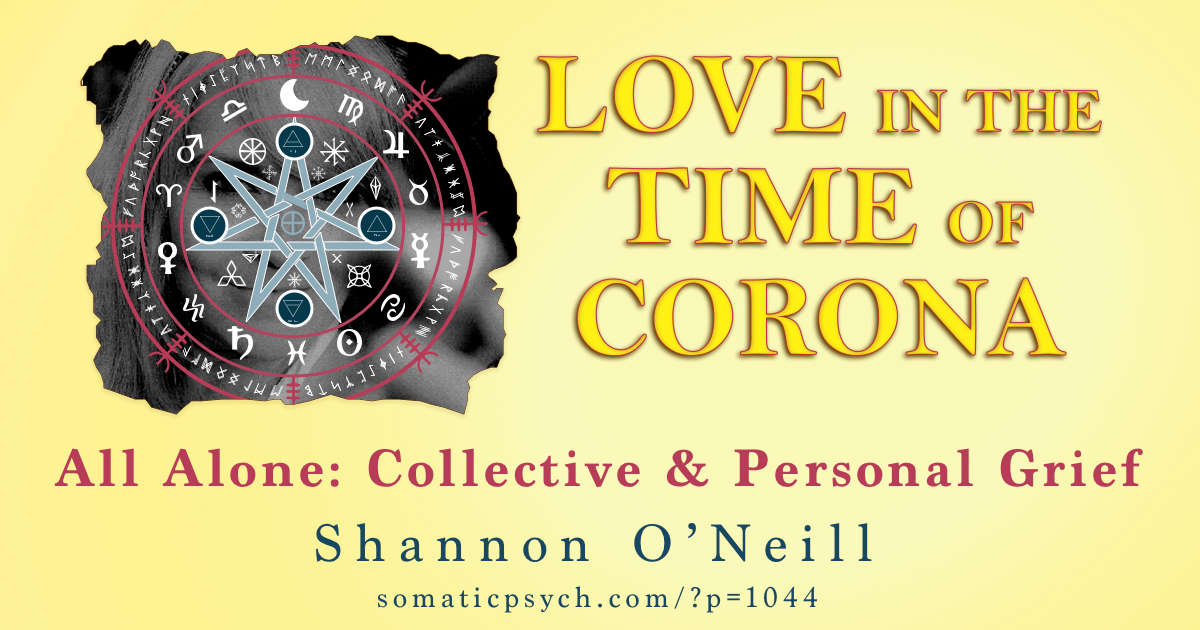All Alone: Collective and Personal Grief

Right now everyone feels worried and isolated in some form or fashion. We all feel loss and perhaps lost as well. When we are powerless over our circumstances, and there’s nowhere to turn, our bodies experience neurological changes.
One phenomenon in such circumstances is serotonin deficiency. Low serotonin equals sad and worried. It is a part of the neurobiology of grief and loss. Serotonin is a neurotransmitter that’s associated with the feeling of wellbeing, social behavior, digestion, sleep, memory, and sexual desire. This “happy” chemical is made primarily in the gut, but is also made in the brain and the heart. Evolutionarily, this chemical chronicles our wins and losses, and is genetically keyed into most animal species. Even tiny fruit flies have decreased serotonin levels when they lose a resource like food, territory, or a mate. Human beings are no exception to this biological reality. Charged with stay home orders, social distancing, increased unemployment, and loss of life, we all have been delivered to the neurobiology of grief and loss. We are personally and collectively grieving.
Grief, like all our emotions, is a millions-of-years-old-tool for our survival. This emotion facilitates mourning loss so that we can move on. Unfortunately, our species often experience complicated grief. This ambiguous form of grief is disconnected and dissociated. When people win at the expense of others and/or when we don’t know when the losses will end, our brains and nervous systems are unable to mobilize mourning physiology. This is literally unnatural.
Our long history of “civilization” has domesticated and instinct injured us in a manner that can result in the dysregulation of emotional states-hence the term “mood disorder” : a mood that is out of order.
In other words, we can get stuck alone in loss physiology. This neurological lockdown makes one feel shut out, shut down, forgotten, and diminished.
Consider what it must be like for:
- Animals in a zoo
- Animals whose habitat has been destroyed
- People whose lands and neighborhoods have been colonized, occupied, or gentrified
- Children and adult children who’ve been sexually abused by a family or community member
- People of color
- LGBTQ+ folks
- People who are disabled
So many beings feel this untenable way every day and have for years or even lifetimes before the quarantine. Indigenous and Aboriginal people have existed in these conditions by a mandate for decades. So many have lived in virtual, actual, and neurological reservations for long periods. They are the marginalized, the demoralized, and the disappeared.
These times remind us that no one escapes the flesh and blood fact of grief and loss. It is a depleted state. It can result in exhaustion, obsessive thoughts, cravings, sleep disturbances, physical pain, low self-esteem. This is the biology of defeat.
The only wholesome way to “win” is to connect to ourselves and each other as much as possible.
We can start by embodying acts of kindness for others. We can follow the shining example of all the beings who found a way to express and uplift themselves from being held back and held down. Read Sojourner Truth’s “Ain’t I a Woman” speech or The Diary of Anne Frank. Watch a video or movie that shows heroic acts of love. Take a walk, donate your time and resources to others-especially those who’ve walked the “quarantine” path before you, soak up some Sun, schedule a virtual session with a therapist, do square breathing, write a letter of thanks to an essential worker, hug a tree… All these can help replenish serotonin levels and restore you to empathic attunement with others.
There are certainly things over which we have no power. However, there are things we can and ought to change. We can employ win-win strategies through mutual aid.
Although we are not all in the same boat, we are sailing the same turbulent seas. We must humbly acknowledge that in some ways we are, in fact, all alone. Perhaps we could face that together: All for one and one for all.
Next In Series: Attachment Style During Social Distancing
